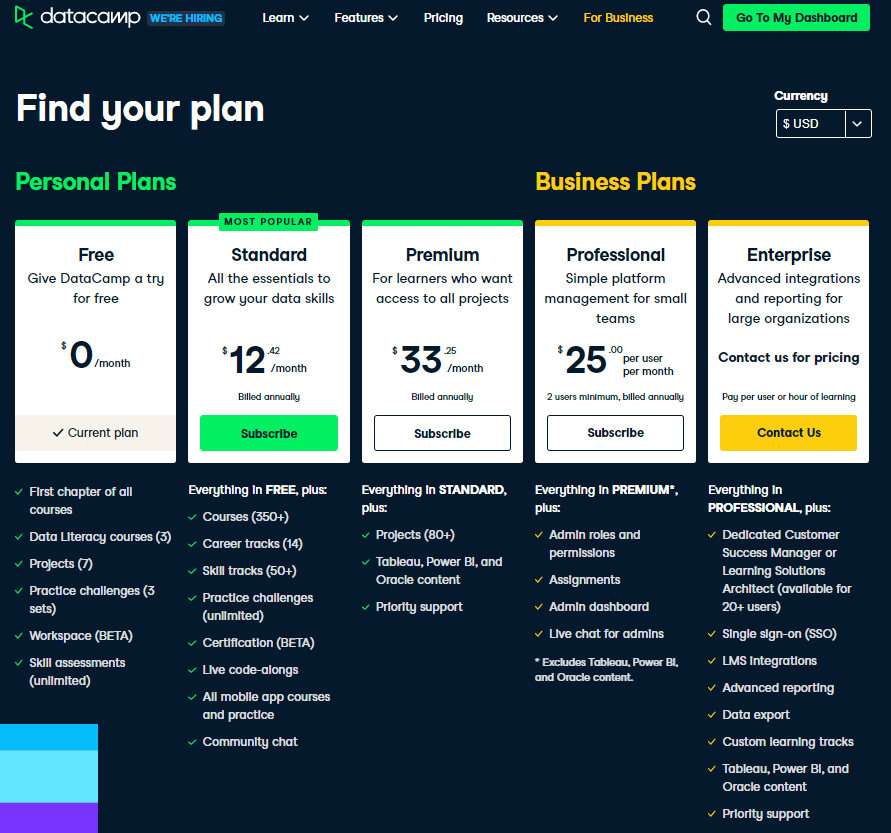DataCamp Review 2021
Data science skills are in demand today. The Harvard Business Review called a data science job the “sexiest job” of the 21st century. Ever-increasing amounts of data are created every day. Companies are investing in data science to tap into the insights to grow their business and make data-based decisions.
There are several online data science courses in the market like Simplilearn, Coursera, Udemy, and Udacity. Even Harvard, MIT, and Microsoft offer some online courses on Data Science. In this review we will see how DataCamp has a unique offering.
Data Science Roles
The main roles in data science are Data Engineers, Data Analysts, Data Scientists, and Machine Learning Scientists.
Data Engineers work on the architecture of how the data will be acquired, stored, and accessed. They build pipelines for the data flow and storage. The tools they use are SQL to organize and store data, programming languages like R and Python for data processing, Shell command line language to automate and run tasks. They may also require skills on Cloud computing skills like AWS, Azure, and GCP to work with cloud-hosted data.
Data Analysts work on initial analyses, data cleaning, creating reports, and visualizations. The tools they use are SQL, spreadsheets, BI, and visualization tools like Tableau and Power BI, as well as programming languages like R and Python for data preparation and analysis.
Data Scientists need to have good knowledge of statistical methods. They analyze and experiment with data to draw deeper insights, often using machine learning. Data scientists use tools like SQL, and programing language data manipulation libraries like pandas in Python and tidyverse in R.
Machine Learning Scientists specialize and are focused on machine learning. They build and use machine learning techniques for classification, prediction, and deep learning models. They use machine learning libraries like TensorFlow and Spark with programming languages like Python and R.
DataCamp’s Data Science Courses
What makes DataCamp’s unique as compared to other packaged online courses is that you can start for free and access the first introductory chapter in any course. Courses are available for both Individual learners and Small Teams. The course content is created by experts drawn from Universities and Industry.
Getting Started
Create a free account right away You can start with a free subscription using your Google, Facebook, LinkedIn id, or your email id.
You get access to the first chapter of any course for free. With you free subscription, you also get free access to basic data literacy courses, a workspace, some projects, and assessments.
When you pay and signup for the membership (monthly or a full year), you can access all the chapters and more.

Picking your Course
There are 14 Career tracks to choose from, for example, Python programmer, Data Scientist, Data Analyst, Data Engineer, Statistician, etc.
You can also select based on your chosen technology (R, Python, Scala, SQL, etc) and Skill track, for instance, Data manipulation with R, or Data manipulation with Python, Supervised Machine Learning with R, etc. There are more than 50 skill tracks to choose from.
Course Content
The content on a particular skill track is split into Bite-sized courses (mostly 4-6 hours in length) as Beginner, Intermediate, and Advanced levels courses.
There are 350+ courses and new courses are often added to the course library.
Every course lists out the prerequisite courses with links so that you can follow the proper learning sequence.
The courses consist of short videos (about 3 to 6 minutes) followed by exercises on the same topic. The intent is on learning by doing.
Coding-based exercises require writing code snippets instead of writing full programs.
Testing your Learning
There are additional Practice Quizzes to test your learning.
The Quizzes are available on DataCamp’s Mobile App as well. You can crack them while commuting to work.
You can work on Projects for which the environment (Jupyter notebook) is provided on the DataCamp portal itself.
Earn XP points based on the courses, quizzes, or projects you complete.
Your Learning Progress on the courses is recorded and you get a certificate for each course which you can share on your LinkedIn profile as well on other social media platforms.
Certification
After you have completed the Data science skill track in either Python or R along with the SQL fundamentals course, you can take assessments and a case study and get a Data Scientist Certification.
Pricing
Standard Plan which is USD 12.42 (INR 925.59) per month billed annually you get access to 350+ courses across 14 Career tracks and 50+ skill tracks.
Premium Plan which is USD 33.25 (INR 2477.94) per month billed annually you can get access to all the projects (80+) as well as Power BI and Tableau content.
Professional Plan for small teams for USD 25 (INR 1863.11) per person per month. It includes most of the Premium Plan content along with an Admin account and Admin Dashboard.
Billing can be done in USD, GBP, CAD, AUD, EUR, JPY and INR.

Pros and Cons of DataCamp
Pros
- Pick and Choose courses as per Career Track and Skill Track
- Free access to first chapter of all Courses
- Self-paced learning
- Bite-Sized courses with Short videos and Exercises
- Projects
- Practice Quizzes
- Certification
- Free Workspace
- Access to new courses in the same subscription
Cons
- Limited Projects in Standard Plan
- Certification is not accredited


